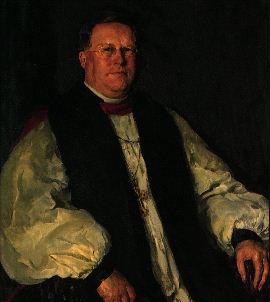

"William Temple was the outstanding British religious leader of this century. He believed that the 'modern state' was incomplete without a modern Christian church, which should set the moral and political tone of the community. His political and religious best-seller, Christianity and Social Order, which was published as a Penguin Special in 1942, was one of the sources of the wide support for the British Welfare State of the 1950s. Temple was the most successful and controversial of British 'priests in politics', because as Archbishop he combined the idea of a national unity rooted in a common set or religious/moral values with a constant demand for political change in the direction of greater social equality. He thus combined conservative and radical impulses to a remarkable degree." (quoted from the cover of William Temple: Church, state and society in Britain, 1880--1950 by John Kent, Cambridge University Press, 1992)
Temple was also one of the prime movers in the creation of the World Council of Churches, which brought together the Orthodox, Anglican and mainstream Protestant churches as a way of transcending their local national limits and playing a creative role in world affairs. He was its first official leader.